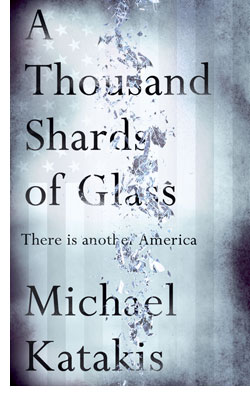 |
 |
 Michael Katakis
Michael Katakis
A Thousand Shards of Glass
Simon & Schuster UK
UK Hardcover First Edition
ISBN 978-1-471-13143-1
Publication Date: 02-13-2014
128 Pages; £10.99
Date Reviewed: 04-14-2014
Reviewed by: Rick Kleffel © 2014
Index:
Non-Fiction
Who are we, and who might we become? The questions are simple but one would be tempted to presume that the answers are not. Breaking down the barriers of self-defense to re-build a better self-image are tall orders, not to be taken lightly.
And yet, a lightness is what is required here. Having been diagnosed and presented with a cure, we must be willing to admit to the illness in order to pursue the remedy. This is a job best suited for the written word. The proper words can serve as an incantation. After all, we think in language. Reading is a means of re-thinking our world.
'A Thousand Shards of Glass' by Michael Katakis begins with an essay of the same name that sets the tone for much of what follows. Katakis writes with an economic elegance about the rift between America as advertised and America as experienced with the passion and precision of a poet. He conflates the personal and the political with a disarming ease, bringing us into his writing as if we are in conversation with him. He's crisp and concise, but musical. This introduction is the most charming welcome to hell you're ever likely to experience.
The works that follow, mostly but not all personal essays, take on the American rift, the luxury gap, with a graceful assurance that makes even the most distressing stories he tells rewarding reading experiences. The core of the collection is fury and love entwined in "Dying the American Way," the story of American healthcare as a voracious monster that consumed the author's wife. It's heartbreaking, rabble-rousing and eloquent, following on the tone of the introduction. "Thanks for the Dance, Mr. Vidal" examines the positive power of art and the sort of language one experiences in the book itself. There are two sections of "Other Voices," prose samples from the writer's travels. It's cut-and-paste collage art in prose, moving beyond the author's voice to give a feel for what's out there.
Katakis takes up a variety of thorny issues. He proposes a universal, no-exceptions-period draft, from ages 28 to 72, suggesting that we might think twice before embarking on quests for blood and treasure if we all had to pitch in. He discusses gun violence as seen in America from abroad, asks what a country is for, and leaves no doubt what he thinks of the architects of both 9/11 and the American response.
To write all this, I realize that many might think this is a political book with a particular leaning, but that is simply not the case. The language is simply too precise, too elegant, and the tone is unerringly personal. You can imagine yourself as a reader, huddled down with the writer. There's a sense of comfort even when what you're reading might seem to be uncomfortable. Even if you disagree vehemently with the ideas presented here (and more than a few will), there's no question that the writing itself is pristine. Prepare to be engaged and enraged.
As should be, the prose and poetry here are the real stars. This is a book that will make you want to read it aloud. It offers readers an experience of the very peculiar and particular power of human language. It's fun to read; the clarity on display is ever-breathtaking, even if what you're seeing is a flat-out, self-inflicted disaster.
We seem to have a good grasp on disaster. We've been able to blow up the world for well over half a century. In 'A Thousand Shards of Glass,' Michael Katakis uses elegant language in prose poetry essays to suggest that we've already done so, and that we can un-break the mirror — not as easily as it was shattered, to be sure. But it is within our power to do so. We have words and hearts. We need nothing more.
|
 |
|
|
 |
| |
Review Archive
All Reviews alphabetized by author.
General Fiction
Non-Genre, general fiction and literature.
Horror
Supernatural fiction, supernatural horror and non-supernatural horror.
Science Fiction
Science fiction, science fantasy, speculative fiction, alternate history.
Fantasy
Fantasy, surrealism and magic realism.
Mystery
Crime, thrillers, mystery, suspense.
Non-Fiction
Non-Fiction, True Crime, Forteana, Reference.
Poetry
|
|
 |
|




